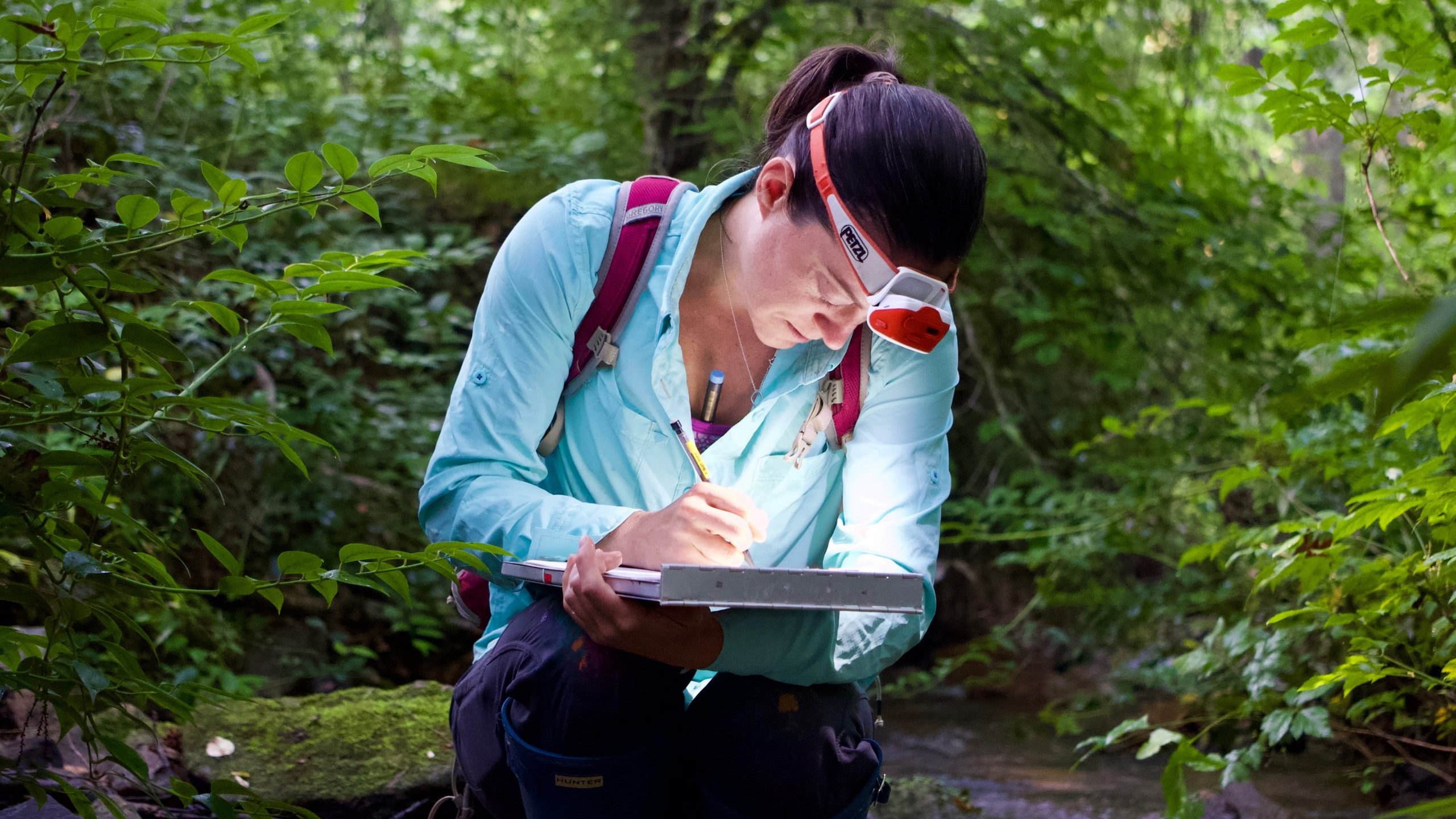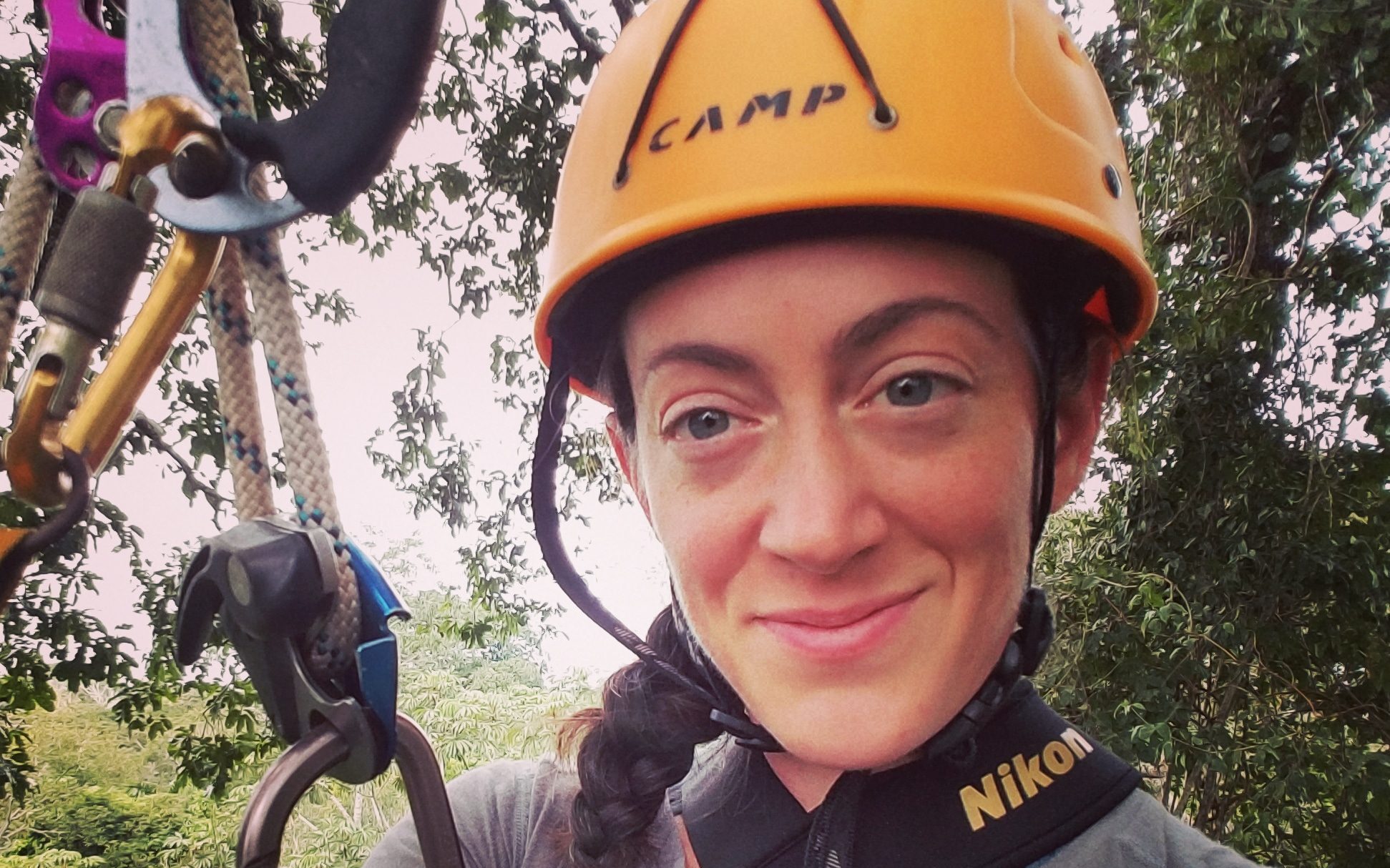Researcher Spotlight – Samantha Jordt

2020-21 Global Change Fellow
Master’s Student, Department of Applied Ecology
Advisor: Dr. Brad Taylor
Every year the Southeast Climate Adaptation Science Center funds a multi-disciplinary cohort of Global Change Fellows representing colleges across NC State University. Here are some highlights about 2020-21 Fellow, Samantha Jordt and the applied research she’s conducting.
About You
What do you study?
I study aquatic insects in restored streams and how stream restoration might be improved by integrating insect life history strategies into their designs. The insects I study develop within the stream, emerge to mate, then use a rock or piece of wood sticking up out of the water to crawl under and cement their eggs. I am increasing egg laying habitat in five of ten restored streams in North Carolina to see if adding this type of habitat can increase egg abundance and diversity in these streams.
What (or who) influenced you to go into this field of study?
I really influenced myself to go into this field of study. I grew up in rural Wisconsin, as the daughter of a single mother from Chicago who thought it would be easier to raise her two girls outside of a remote town than in a city. I loved being outside and roaming the nearby streams to collect bugs but I had no idea that that could be a career. As an undergraduate, I happened into an entomology class that ignited my interest but I struggled with financial insecurity and needed higher paying jobs than the department could offer. After graduating and paying off my student loans, I really leaned into exploring those interests. I was fortunate to have unwavering support from my fiancé, so when I found a job listing in Dr. Taylor’s lab that just lit me up, I immediately reached out and the rest is history!
What do you think is the most pressing issue related to global change?
I see two ways to answer this question. On the physical plane, water quality is a massive issue. On the social plane, it is the lack of action which disproportionately impacts black, brown, and Indigenous people and people of low socio-economic status.
About Your Research

What is the most important thing that you’ve learned?
One surprising finding from my first field season is that rocks move more in restored streams than they do in reference streams and that movement may cause egg mortality. This is important because there were fewer rocks suitable for egg laying in restored streams compared to reference streams and more aquatic insect eggs were laid on the few rocks available. On the other hand, adding more rocks to restored streams did not lead to more rocks moving but it did increase the number of eggs laid in those streams.
How can your research be used to inform management decisions?
I am thrilled to say that the manipulation of egg-laying habitat in restored streams did increase the abundance of mayfly, caddisfly, and true fly eggs in those streams. This manipulation was done by two people in a single day and is something that could reasonably be incorporated into restoration designs of applicable streams. It is also an example to managers that looking at restoration from different perspectives might reveal simple solutions to problems such as low insect recruitment.
How would you describe your research to a 3rd grader?
There are so many different bugs that live in streams and they are a very important part of a functioning stream ecosystem because they do a little bit of everything. They eat moss, leaves, and even each other. They are also food for fish, birds, and bats. When we restore streams, we try to fix the stream so the bugs and fish will come back but a lot of times they don’t. I’m trying to figure out why and if there is something we can do to help.
About Your Global Change Fellow Experience
How do you expect the SE CASC Global Change Fellows Program to impact you and your work?
My experience as a SE CASC fellow has broadened my contextual framework when studying stream restoration. Put another way, my experience has placed stream restoration within the framework of global climate change and social justice.
What has been the most rewarding part of being a SE CASC Global Change Fellow?
Being a student during COVID-19 has been hard. One major challenge derives from being isolated and not being able to have organic “hallway” discussions. The Global Change Fellowship provided a much needed sense of community and beyond that, it provided me with a network and friendships across disciplines which I greatly appreciate.
Miscellaneous
As (fellow Global Change Fellow) Rebecca Asser put it, I too would like to acknowledge that “I am residing on the stolen lands of the Skahruhreh/Tuscarora, Lumbee, and Coharie people. It is because of this unjust history that we reside and study in present-day Raleigh, NC.” Lastly, stream restoration is a young science and will require humility and collaboration with a diverse set of practitioners, stakeholders, and scientists if it is to be effective.
